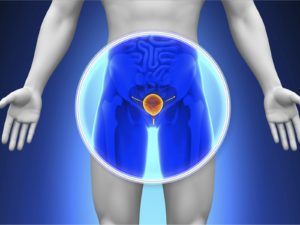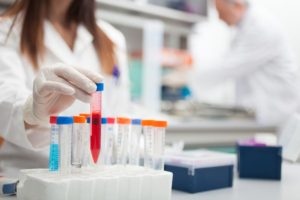Prostate Cancer Samples
Bay Biosciences provides fresh frozen clinical grade Prostate cancer, tumor tissue samples with matching high quality serum (sera), plasma and peripheral blood mononuclear cells (PBMC) biofluid samples derived from prostate cancer patient’s whole blood, under customized processing protocols. Samples are collected from unique multi-ethnic prostate cancer patients at multiple urology collection sites for development, drug discovery and research.
Detailed clinical data, biomarker information, Prostate-specific antigen (PSA), digital rectal exam (DRE) and pathology annotations, Gleason scores, prostate cancer patients smoking and diet history associated with the tumor tissue samples, serum (sera), plasma and PBMC biofluid samples is provided to a valued customer for research, discovery and development.

Prostate cancer is a form of cancer that develops in the prostate gland. The prostate gland is about the size of a walnut and weighs about one ounce, it is located below the bladder and in front of the rectum. In men, prostate cancer is the most frequently diagnosed cancer in 112 countries worldwide, making it most common type of cancer incidence in 2020. Prostate cancer is the most most common cancer among men in the United States. It is also one of the leading causes of cancer death among men of all races and Hispanic origin populations. Prostate cancer cells can spread by breaking away from a prostate tumor. They can travel through blood vessels or lymph nodes to other parts of the body. After spreading, cancer cells may attach to other tissues and grow to form new tumors, causing damage to other parts of the body.
Prostate Gland
The prostate is a walnut-sized gland located behind the base of the penis, in front of the rectum, and below the bladder. It surrounds the urethra, the tube-like channel that carries urine and semen through the penis. The prostate’s main function is to make seminal fluid, the liquid in semen that protects, supports, and helps transport sperm. The prostate continues to enlarge as people age. This can lead to a condition called benign prostatic hypertrophy (BPH), which is when the urethra becomes blocked. BPH is a common condition associated with growing older, and it has not been associated with a greater risk of having prostate cancer.
Prostate Cancer Overview
Prostate cancer is somewhat unusual when compared with other types of cancer. This is because many prostate tumors do not spread quickly to other parts of the body. Some prostate cancers grow very slowly and may not cause symptoms or problems for years or ever. Even when prostate cancer has spread to other parts of the body, it often can be managed for a long time. So patients with prostate cancer, and even those with advanced prostate cancer, may live with good health and quality of life for many years. However, if the cancer cannot be well controlled with existing treatments, it can cause symptoms like pain and fatigue and can sometimes lead to death.
Histology is how cancer cells look under a microscope. The most common histology found in prostate cancer is called adenocarcinoma. Other, less common histologic types include neuroendocrine prostate cancer and small cell prostate cancer. These rare variants tend to be more aggressive, produce much less PSA, and spread outside the prostate earlier.
Prostate-Specific Antigen (PSA)
Prostate-specific antigen (PSA) is a protein produced by cells in the prostate gland and released into the bloodstream. PSA levels are measured using a blood test. Although there is no such thing as a “normal PSA” for anyone at any given age, a higher-than-normal level of PSA can be found in people with prostate cancer. Other non-cancerous prostate conditions, such as benign prostatic hypertrophy (BPH) or prostatitis can also lead to an elevated PSA level. Prostatitis is the inflammation or infection of the prostate. In addition, some activities like ejaculation can temporarily increase PSA levels. Ejaculations should be avoided before a PSA test to avoid falsely elevated tests. People should discuss with their primary care doctor the pros and cons of PSA testing before using it to screen for prostate cancer.

Prostate Cancer Gleason Score
The Gleason scoring system is the most common prostate cancer grading system used. The pathologist looks at how the cancer cells are arranged in the prostate and assigns a score on a scale of 3 to 5 from 2 different locations. Cancer cells that look similar to healthy cells receive a low score. Cancer cells that look less like healthy cells or look more aggressive receive a higher score. To assign the numbers, the pathologist determines the main pattern of cell growth, which is the area where the cancer is most obvious, and then looks for another area of growth. The doctor then gives each area a score from 3 to 5. The scores are added together to come up with an overall score between 6 and 10. Gleason scores of 5 or lower are not used. The lowest Gleason score is 6, which is a low-grade cancer. A Gleason score of 7 is a medium-grade cancer, and a score of 8, 9, or 10 is a high-grade cancer. A lower-grade cancer grows more slowly and is less likely to spread than a high-grade cancer.
Prostate Cancer Signs and Symptoms
Following are the common signs and symptoms of prostate cancer:
- Frequent urination (overactive bladder)
- Weak or interrupted urine flow or the need to strain to empty the bladder
- The urge to urinate frequently at night (nocturia)
- Blood in the urine (hematuria)
- Erectile dysfunction
- Pain or burning during urination
- Pain or discomfort when sitting, caused by an enlarged prostate
If cancer has spread outside of the prostate gland, symptoms may include:
- Pain in the back, hips, thighs, shoulders, or other bones
- Swelling or fluid buildup in the legs or feet
- Unexplained weight loss
- Fatigue
- Change in bowel movements
Prostate Cancer Risk Factors
Certain men are at higher risk than others for developing prostate cancer, which may affect when they should start being screened. The risk of developing prostate cancer increases with age, particularly after age 50. Following are some of the risk factors of developing prostate cancer:
- African American men are twice as likely as Caucasian white men to develop the disease.
- Having a family history of prostate cancer. A father or a brother diagnosed with prostate cancer, particularly if it is at a relatively early age, increases the risk of developing prostate cancer.
- Having a family history of breast and ovarian cancer may also be associated with an inherited risk of developing prostate cancer
- High-fat diet and/or obesity
- Smoking
- A sedentary lifestyle
However, there may be measures to aid in the prevention of prostate cancer and that can reduce risk, including regular exercise and diets low in fat and high in fruits, vegetables and whole fibers. Foods with high amounts of the antioxidant lycopene, such as tomatoes, grapefruit, and watermelon may help to lower the risk of developing prostate cancer.
Prostate Cancer Diagnosis
Prostate cancer diagnosis starts with the following screening tests:
- Digital rectal examination (DRE): Doctor inserts a lubricated gloved finger into the rectum to check for lumps on the prostate.
- Prostate-specific antigen (PSA) blood test: a blood sample is analyzed for levels of a protein produced by the prostate that, when elevated, can indicate the presence of cancer.
- New urinary (PCA3 and MDx Select) and blood (4K score and PHI test) biomarkers are also used at times to screen for prostate cancer in men considered to be at-risk for the diagnosis.
Prostate Cancer Genetics
Genes that may carry an increased risk of developing prostate cancer include the following:
HPC1, HPC2, HPCX, CAPB, ATM, FANCA, HOXB13, and mismatch repair genes. However, none of them has been directly shown to cause prostate cancer or be specific to the disease. Research to identify genes associated with an increased risk of prostate cancer is ongoing, and researchers are constantly learning more about how specific genetic changes can influence the development of prostate cancer. At present, there are no genetic tests available to determine someone’s chance of developing prostate cancer.

Bay Biosciences is a global leader in providing researchers with high quality, clinical grade, fully characterized human tissue samples, bio-specimens and human bio-fluid collections from cancer (tumor) tissue, cancer serum, cancer plasma cancer PBMC and human tissue samples from most other therapeutic areas and diseases.
Bay Biosciences maintains and manages it’s own bio-repository, human tissue bank (biobank) consisting of thousands of diseased samples (specimens) and from normal healthy donors available in all formats and types. Our biobank procures and stores fully consented, deidentified and institutional review boards (IRB) approved human tissue samples and matched controls.
All our human human tissue collections, human specimens and human bio-fluids are provided with detailed samples associated patient’s clinical data. This critical patient’s clinical data includes information relating to their past and current disease, treatment history, lifestyle choices, biomarkers and genetic information. Patient’s data is extremely valuable for researchers and is used to help identify new effective treatments (drug discovery & development) in oncology, other therapeutic areas and diseases. This clinical information is critical to demonstrate their impact, monitor the safety of medicines, testing & diagnostics, and generate new knowledge about the causes of disease and illness.
Bay Biosciences banks wide variety of human tissue samples and biological samples including cryogenically preserved -80°C, fresh, fresh frozen tissue samples, tumor tissue samples, FFPE’s, tissue slides, with matching human bio-fluids, whole blood and blood derived products such as serum, plasma and PBMC’s.
Bay Biosciences is a global leader in collecting and providing human tissue samples according to the researchers specified requirements and customized, tailor made collection protocols. Please contact us anytime to discuss your special research projects and customized human tissue sample requirements.
Bay Biosciences provides human tissue samples (human specimens) from diseased and normal healthy donors; including peripheral whole-blood, amniotic fluid, bronchoalveolar lavage fluid (BAL), sputum, pleural effusion, cerebrospinal fluid (CSF), serum (sera), plasma, peripheral blood mononuclear cells (PBMC’s), saliva, Buffy coat, urine, stool samples, aqueous humor, vitreous humor, kidney stones, renal calculi, nephrolithiasis, urolithiasis and other bodily fluids from most diseases including cancer. We can also procure most human bio-specimens and can do special collections and requests of human samples that are difficult to find. All our human tissue samples are procured through IRB approved clinical protocols and procedures.
In addition to the standard processing protocols Bay Biosciences can also provide human plasma, serum, PBMC bio-fluid samples using custom processing protocols, you can buy donor specific sample collections in higher volumes and specified sample aliquoting from us. Bay Biosciences also provides human samples from normal healthy donors, volunteers, for controls and clinical research, contact us Now.
日本のお客様は、ベイバイオサイエンスジャパンBay Biosciences Japanまたはhttp://baybiosciences-jp.com/contact/までご連絡ください。


